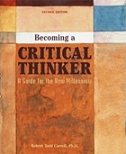From Abracadabra to Zombies | View All
Truster & Computer Voice Stress Analyzer
"Truster is a fully computerized voice stress analyzer that allows you to detect the truth instantly."
Sound too good to be true? The best part is that it only costs $89. It was $189, according to the ad. According to a competitor, The National Institute For Truth Verification, the Truster used to sell for as much as $2,500. Business might have dropped off when they issued a Hot Press Release announcing they'd analyzed President Clinton's denial of having had sexual relations with "that woman," Monica Lewinsky. According to the Truster, Clinton was telling the truth.
(update: Truster seems to have found a more profitable hook; the website now sells software: "Stealth Phone spy software allows you to listen into phone calls, get SMS text copies forwarded and work as a room bug. Give one to your target and find out the truth.")
What is a voice stress analyzer, you might wonder? It is a machine that measures components of the human voice--frequency modulations--that are correlated with stress. No machine can detect stress directly, much less distinguish whether the stress is due to lying, guilt, stutter, fear, constipation, or some other emotion or physical condition. The frequency modulations, called "micro tremors" by those who measure them, must be interpreted by a human being. The machine doesn't do the analysis, the examiner does.
The Truster is manufactured by Makh-Shevet of Israel. It is not the voice stress analyzer of choice among American law enforcement agencies, however. That honor belongs to the machine manufactured by the swell-sounding National Institute for Truth Verification (NITV) of West Palm Beach, Forida, which sells its Computer Voice Stress Analyzer (CVSA) for $9,250. NITV also charges $1,215 per student for a six-day training session. (Prices are subject to change, of course.) NITV claims that over 800 law enforcement persons are using their machines. The CVSA is a digital device run with software on a laptop, making it very convenient and easy to take anywhere. Furthermore, it can be hooked up to a tape player, making it unnecessary for the subject to be present while getting a truthover. The computer "processes these voice frequencies and graphically displays a picture of the voice patterns." The display can be printed out, as well.
How accurate are the voice stress analyzers? According to Gary Baker of Baker Associates
Hundreds of professional studies in the fields of law enforcement, medicine, psychiatry, psychology, military, business, security, pharmacology, and government have consistently shown VSA validity, reliability and accuracy at above 96%.*
Unfortunately, Mr. Baker doesn't mention any of these studies so I can't refer the reader to them. However, an expert in these matters did a SCAN of the above statement and determined that it is most probably false.
Just how deceptive is the advertising for the Deception Detector? NITV claims
Unlike the polygraph, drugs do not affect the results of the exam and there are no known counter-measures that will cause the ubiquitous "inconclusive" results associated with the polygraph.*
It's true that VSA does not allow an "inconclusive" reading. The investigator, however, has three options. He or she may conclude "Deception Indicated" or "No Deception Indicated", or " No Opinion - Additional Testing Required." Technically, having no opinion is not the same as being inconclusive, but the consequence is the same: the subject neither passes nor fails the Truth Test and gets the equivalent of an Incomplete grade.
Needless to say, NITV had no more difficulty finding law enforcement people to endorse this new device than did Wade Quattlebaum for his Quadro Tracker. Again, we have to ask: why are law enforcement personnel especially gullible when it comes to pseudoscientific devices such as these? The fact is, it is not just law enforcement who are seduced by the promises of a quick and dirty test to tell who is lying. Devices such as these are used by retailers, law firms, small businesses, large corporations, and the military. One hopes this wide array of users is indicative of cynicism and a low opinion of those the device is used on, rather than a sincere belief in the scientific validity of the machines.
One would hope any scientist would recognize that since several equally plausible factors can cause what they are observing in every single instance there can be no theory to support a method for distinguishing "micro modulations" caused by the stress caused by lying. Such modulations will appear identical to those caused by constipation, fear, test anxiety, etc. It must always be the judgment of the investigator that identifies any voice modulation as due to lying and that judgment of necessity must be based upon something other than the output of the machine. What is it? Body language? The blue sense? Sometimes, no doubt. But the fact that many people who are subjected to Truth Detection tests actually believe in the validity of the tests and are often frightened into confessing may play a role in the popularity of these machines. Supporting this notion is the kind of evidence NITV puts forth to demonstrate how their machine solves cases. In every case, the bottom line is that the suspect is confronted with the results of the CVSA exam and then confesses.
further reading
Research Casts Doubt On Voice-stress Lie Detection Technology 2/11/2004
Update: Time magazine reports that, according to the Truster, in their presidential debates, Gore lied 23 times, while Bush lied 57 times.



